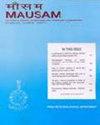Performance of land surface schemes on simulation of land falling tropical cyclones over Bay of Bengal using ARW model
IF 0.7
4区 地球科学
Q4 METEOROLOGY & ATMOSPHERIC SCIENCES
引用次数: 0
Abstract
The present study encompasses the performance of Land Surface Model (LSM) physics on simulation of Tropical Cyclones (TCs) key characteristics - track, mean sea level pressure (MSLP), maximum sustained wind (MSW) and rainfall. The impact of four LSM schemes - Thermal Diffusion, Noah, RUC and Noah-MP, is evaluated for the simulation of Severe Cyclonic Storm (SCS) ‘Vardah’ that crossed Tamil Nadu coast, near Chennai on 12 December, 2016 and Extremely Severe Cyclonic Storms (ESCS) ‘Fani’ that crossed Odisha coast, close to Puri on 03 May, 2019. For this purpose, the Advanced Weather Research and Forecasting (ARW) model, configured with a single domain of 9 km horizontal resolution covering the Bay of Bengalis considered. The initial and lateral boundary conditions to the model integration are taken from National Centers for Environmental Prediction (NCEP) Final Analysis (FNL). The model simulated track is verified with India Meteorological Department (IMD) observed track for both the cases. The model simulated MSW and MSLP at the landfall location is validated with IMD best estimation along with fifth generation European Centre for Medium-Range Weather Forecasts (ECMWF) Re-analysis (ERA5) products. The rainfall associated with both the cyclones are compared with ERA5 and Global Precipitation Measurement (GPM) rainfall for its validation. The track of TCs Vardah and Fani are well simulated with all the four land surface schemes with reasonable accuracy in landfall position and time of landfall of the systems. The Along Track Error (ATE) and Cross Track Error (CTE) are minimal for the unified Noah LSM scheme. The landfall position error (about 2 km only) is significantly improved with the unified Noah scheme. In case of rainfall forecast, LSMs tend to overestimate the rainfall during landfall of both systems. It is also noticed that overestimation is more towards inland than on the coast. Out of all four LSMs, rainfall estimation from the RUC is closest to the GPM and ERA5 rainfall estimates during landfall. In addition to this, RUC scheme intensifies the cyclones in terms of MSLP and MSW during the landfall of the system as compared to the other parameterization schemes.陆地表面方案在模拟孟加拉湾登陆热带气旋上的表现
本研究包括陆地表面模式(LSM)物理对热带气旋(TCs)关键特征——路径、平均海平面压力(MSLP)、最大持续风(MSW)和降雨量的模拟。在模拟2016年12月12日穿过泰米尔纳德邦海岸靠近钦奈的强气旋风暴(SCS)“瓦尔达”和2019年5月3日穿过奥里萨邦海岸靠近普里的极强气旋风暴(ESCS)“法尼”时,评估了热扩散、诺亚、RUC和诺亚- mp四种LSM方案的影响。为此,我们考虑了高级天气研究和预报(ARW)模式,该模式配置了覆盖孟加拉湾的9公里水平分辨率的单一区域。模型积分的初始和横向边界条件取自美国国家环境预测中心(NCEP)最终分析(FNL)。模型模拟的轨迹与印度气象局(IMD)对两种情况的观测轨迹进行了验证。该模式模拟了登陆地点的城市固体废物和最大浮尘,并与IMD的最佳估计以及第五代欧洲中期天气预报中心(ECMWF)再分析(ERA5)产品进行了验证。将这两个气旋的降雨量与ERA5和全球降水测量(GPM)的降雨量进行了比较,以验证其有效性。四种地形方案都很好地模拟了瓦尔达和法尼两种台风的轨迹,系统的登陆位置和登陆时间具有合理的精度。在统一的Noah LSM方案中,沿航迹误差(ATE)和交叉航迹误差(CTE)最小。统一诺亚方案显著改善了登陆位置误差(仅约2 km)。在预报雨量时,LSMs往往会高估两个系统登陆时的雨量。值得注意的是,对内陆的高估多于对沿海的高估。在所有四个LSMs中,RUC的降雨量估计最接近GPM和ERA5登陆时的降雨量估计。此外,与其他参数化方案相比,RUC方案在系统登陆期间在MSLP和MSW方面加强了气旋。
本文章由计算机程序翻译,如有差异,请以英文原文为准。
求助全文
约1分钟内获得全文
求助全文
来源期刊

MAUSAM
地学-气象与大气科学
CiteScore
1.20
自引率
0.00%
发文量
1298
审稿时长
6-12 weeks
期刊介绍:
MAUSAM (Formerly Indian Journal of Meteorology, Hydrology & Geophysics), established in January 1950, is the quarterly research
journal brought out by the India Meteorological Department (IMD). MAUSAM is a medium for publication of original scientific
research work. MAUSAM is a premier scientific research journal published in this part of the world in the fields of Meteorology,
Hydrology & Geophysics. The four issues appear in January, April, July & October.
 求助内容:
求助内容: 应助结果提醒方式:
应助结果提醒方式:


